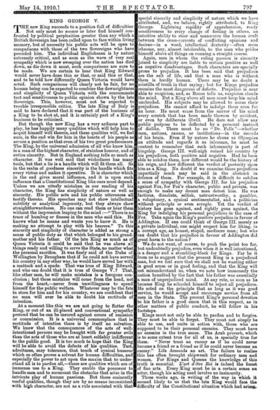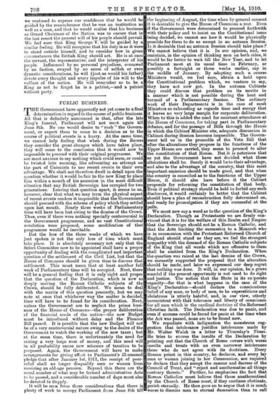KING GEORGE V. T HE new King succeeds to a position
full of difficulties Not only must he sooner or later find himself con- fronted by political perplexities greater than any which a British Sovereign has been called upon to face within living memory, but of necessity his public acts will be open to comparisons with those of the two Sovereigns who have preceded him. The individual Englishman is by nature extremely critical, and as soon as the wave of very real sympathy which is now sweeping over the nation has died down, as die down it must, such comparisons are sure to be made. We are certain to hear that King Edward would never have done this or that, or said this or that, and to be told how differently Queen Victoria would have acted. Such comparisons will clearly not be fair, for no human being can be expected to combine the downrightness and simplicity of Queen Victoria with the consummate tact and sensitiveness to public opinion shown by the late Sovereign. This, however, must not be expected to trouble irresponsible critics. The late King of Italy is said to have declared that it was part of the business of a King to be shot at, and it is certainly part of a King's business to be criticised.
But though the new King has a very arduous part to play, he has happily many qualities which will help him to acquit himself well therein, and these qualities will, we feel sure, in the end win for him in the hearts of his people as secure a position as that even of his two great predecessors. The King, by the universal admission of all who know him, is a man of the highest character, of stainless honour, and of entire sincerity. But in England nothing tells so much as character. It was well said that wickedness has many tools, but that a lie is a handle which will fit them all. So in the realm of goodness sincerity is the handle which fits every virtue and makes it operative. It is character which in the end gives moral influence, and it is upon such influence that a Constitutional King like ours must depend. Unless we are utterly mistaken in our reading of his character, the King has simplicity of nature as well as sincerity. His public acts and his public utterances all testify thereto. His speeches may not show intellectual subtlety or analytical ingenuity, but they always show straightforwardness. No one can read them or hear them without the impression leaping to the mind :—" There is no trace of humbug or finesse in the man who said this. He 'mows what he means and wants you to know it. He is making no attempt to play with his hearers." To this sincerity and simplicity of character is added as strong a sense of public duty as that which belonged to his grand- mother and his father. Of the late King as much as of Queen Victoria it could be said that he was above all things ready and willing to serve the State, no matter what the personal sacrifice. It was finely said of the Duke of Wellington by Brougham that if he could not have served his country in any other way, he would have served her with a mattock and a spade. That was true of King Edward, and who can doubt that it is true of George V.? That, like other men, he will make mistakes is a foregone con- clusion; but these mistakes will come from the head, not from the heart,—never from unwillingness to spend himself for the public welfare. Whatever may be the fate in store for him and for his country, we are confident that no man will ever be able to doubt his rectitude of intention.
At a moment like this we are not going to flatter the King, or out of an ill-placed and conventional sympathy pretend that he can be insured against errors of omission or commission. It is a universal commonplace that in rectitude of intention there is by itself no salvation. We blow that the consequences of the acts of well- intentioned persons may be fraught with far greater evils than the acts of those who are at heart selfishly indifferent to the public good. It is too much to hope that the King will be able to avoid the defects of his qualities. Tact, adroitness, easy tolerance, that touch of cynical humour which so often proves a solvent for human difficulties, and especially the power to act upon the maxim that to under- stand all is to pardon all,—these are qualities which are of immense use to a King. They enable the possessor to handle men and to surmount the obstacles that arise in the intricate play of human passions. But these eminently useful qualities, though they are by no means inconsistent with high character, are not as a rule associated with that special sincerity and simplicity of nature which we have attributed, and, we believe, rightly attributed, to King George. Lightning rapidity of apprehension, ready sensitiveness to every change of feeling in others, an intuitive ability to steer and ma,ncetivre the human craft between the cross-currents of conflicting opinions and desires—in a word, intellectual dexterity—often seem irksome, nay, almost intolerable, to the man who prides himself above all things on running a straight course.
Again, men in whom the ruling passion is sincerity joined to simplicity are liable to certain positive as well as negative disadvantages. Such characters are specially prone to prejudice. It has been said that prejudices are the salt of life, and that a man who is without them is hardly human. There may be no doubt a scintilla of truth in that saying; but for Kings prejudice remains the most dangerous oedefects. Prejudice is near akin to suspicion, and, as Bacon tells us, suspicion clouds the mind. But a King above all men must keep his miud unclouded. His subjects may be allowed to nurse their prejudices. He cannot afford to indulge them even for an hour. He must erase from the mirror of his mind every scratch that has been made thereon by accident, or even by deliberate illwill. He dare not allow any public purpose to be deflected by a personal instinct of dislike. There must be no "Dr. Fells "—whether • men, nations, causes, or institutions—in the records of his brain. Even if by nature he shuns so Olympian an attitude and regards it as inhuman, he must be content to remember that such inhumanity is part of kingship. George III. well-nigh ruined his country by his prejudices, both positive and negative. Had he been able to subdue them, how different would be the history of his reign, and how different the verdict of posterity upon him as a King. No doubt if we examine those prejudices impartially much may be said in the abstract in defence of them. For example, it is difficult to subdue a sense of sympathy with George III. for his prejudice against Fox, for Fox's character, public and private, was enough to make any decent man detest him. He was factious, dissolute, selfish, untrustworthy, a gambler, a voluptuary, a cynical sentimentalist, and a politician without principle or even scruple. Yet the verdict of history has gone e and rightly gone against, the King for indulging his personal prejudices in the case of Fox. Take again the King's positive prejudice in favour of Addington. If one could think of George III, merely as a private individual, one might respect him for liking, in a corrupt age, an honest, stupid, mediocre man ; but who can doubt that his prejudice in favour of Addington did great harm to the nation ?
We do not want, of course, to push the point too far, but undoubtedly prejudice, even when it is well intentioned, is a danger and a stumbling-block for Kings. Far be it from us to suggest that the present King is a prejudiced man, but we feel sure that we shall not be wanting either in good sense or in good feeling, and that the King will not misunderstand us, when we note how immensely the nation benefited by the fact that his father was essentially a man of unprejudiced mind. At any rate, as soon as he became King he schooled himself to reject all prejudices. He acted on the principle that as long as it was good service, he would accept and encourage service from all men in the State. The present King's personal devotion to his father is a good omen that in this respect, as in other matters of public conduct, he will follow in his footsteps.
Kings must not only be able to pardon and to forgive. They must be able to forget. They must not simply be able to use, and unite in action with, those who are supposed to be their personal enemies. They must have no enemies in the true sense. The Arab proverb, which is to some extent true for all of us, is specially true for them. "Never treat an enemy as if he could never become a friend or a friend as if he could never become an enemy." Life demands an art. The failure to realise this has often brought shipwreck for ordinary men and women. For Kings and Queens the knowledge of this truth is essential. L'art d'être Roi is indeed the finest of fine arts. Every King must be in a certain sense an actor, though his acting need. involve no insincerity. Three weeks ago, in writing of the way in which it seemed likely to us that the late King would face the difficulty of the Constitutional situation which had mina.- we ventured to express our confidence that he would be guided by the remembrance that he was an institution as well as a man, and that he would realise that his business as Grand Chairman of the Nation was to ensure that in the last resort the general will of his people should prevail. We feel sure that King George V. will be guided by a similar feeling. He will recognise that his duty is as it were to stand outside himself, and to consider how in given circumstances the British King should act. He is at once the servant, the representative, and the interpreter of his people. Influenced by no personal prejudices, overawed by no faction, swayed by no sense of selfish or even dynastic considerations, he will (just as would his father) devote every thought and every impulse of his will to the welfare of the nation. He will remember so to be a King as not to forget he is a patriot,—and a patriot without party.







































 Previous page
Previous page